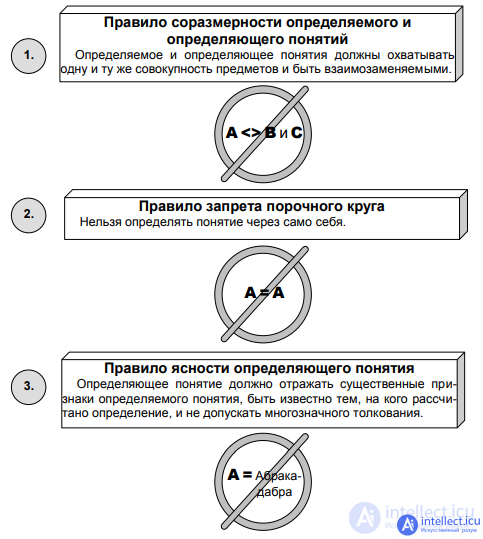Lecture
§ 8.3. Definition
Definition is a logical operation that reveals the content of a concept. To define a concept means to indicate what it
means, to reveal the features that are included in its content. An important task of the definition is to distinguish the determined object from all others.
Definitions are divided into explicit and implicit.
An explicit definition takes the form of the equality of two concepts - the definable and the determining (that is, the unknown concept is defined through the known).
An explicit definition is described by the formula:
A is B and C,
where: A is a defined concept, B is a genus (a concept more general with respect to A), C is a species difference (characters that distinguish objects A
from all objects B),
together “B and C” is a defining concept.
Consider an example of an explicit definition: "Man is an animal that can read." This is evidenced by the site https://intellect.icu. Can people read? Usually yes.
And at the same time, it is intuitively clear that this definition is not formulated correctly.
How will be correct?
In order for an explicit definition to correctly perform its function, that is, to reveal the content of the concept being defined,
it must comply with a number of rules (Fig. 8.4).
In case of violation of the rules presented in Fig. 8.4, the following errors occur in explicit definitions:
1. An error of too broad a definition — the scope of the defining concept is wider than the scope of the concept being defined. For example: "Crisis
is a sharp change in the enterprise." With this definition, a sharp transition to prosperity in the enterprise also falls under the concept of crisis.
2. The error of a too narrow definition - the scope of the defining concept is already the scope of the concept being defined. For example: “A crisis is a sharp deterioration in the performance of domestic enterprises.” With this definition, the economic crisis translates into the category of purely Ukrainian phenomena.
3. Vicious circle error: "Crisis is crisis."
4. Mistake of unclear definition: "Crisis is the end of the world."

Fig. 8.4. Definition Rules
An implicit definition is a definition that does not have the form of equality of two concepts (defined and determining).
If explicit definitions are characteristic of scientific texts, then implicit definitions are more common in everyday life. Implicit are contextual and intensive definitions. A contextual definition is a definition of a concept from context, from a passage of text. In this case, the entity concepts manifests itself through its relationship with other concepts in the text. A special case of a contextual definition is the definition of an object through a list of its functions (for example: “does not bark, does not bite, does not let into the house”). A broad definition is a definition by display. For example, the student asks the teacher what the demand curve is, and the teacher, without going into verbal explanations, draws a demand curve on the board.
Comments
To leave a comment
Fundamentals of Scientific Research and the organization of research activities
Terms: Fundamentals of Scientific Research and the organization of research activities